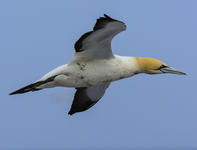
Name
Cape Gannet (Morus capensis)Cape Gannet Appearance
Unmistakable appearance, at 89 cm, the Cape gannet is a large white and black sea bird, with a yellow head. A long pale blue bill has black edges and a long gular stripe on the throat. This gannet has a silvery cream/blue eye. Juveniles are dark brown and gradually turn white as they mature.Cape Gannet Diet
Feeds almost exclusively on shoaling pelagic fish (like sardines and pilchards).Cape Gannet Breeding

Cape Gannets breed on offshore islands, with three breeding sites found in South Africa. The female lays a single egg that both parents will incubate for around 42 days. Cape gannets use their feet to incubate the egg.
The webbed feet are wrapped around the egg to keep it warm. The chick is fed by both parents until it fledges at around 100 days. Cape Gannets mate for life and perform greeting rituals at the nest, by stretching their bills upwards and gently tapping their bills together.
Cape Gannet Behaviour
When hunting the Cape gannet flies at a height of between 10 and 30 m above the water, when fish are spotted, it will plunge headfirst into the water to catch the fish. The gannet can plunge as deep as 10 m under the water.
The fish is normally swallowed before the gannet returns to the surface. Gannets will plunge feed in flocks. They can hit the water at speeds of up to 100 km/hour. Cape gannets are expert fliers, once in the air. On land, they need a runway to build up speed before they can take off.
 SouthAfrica.co.za provides informative, educational content on many South African bird species that orthologists and bird-watchers would enj...
SouthAfrica.co.za provides informative, educational content on many South African bird species that orthologists and bird-watchers would enj... Also known as the Rock Lobster Capital of South Africa, Lamberts Bay is a picturesque South African holiday and fishing village in the Weste...
Also known as the Rock Lobster Capital of South Africa, Lamberts Bay is a picturesque South African holiday and fishing village in the Weste...